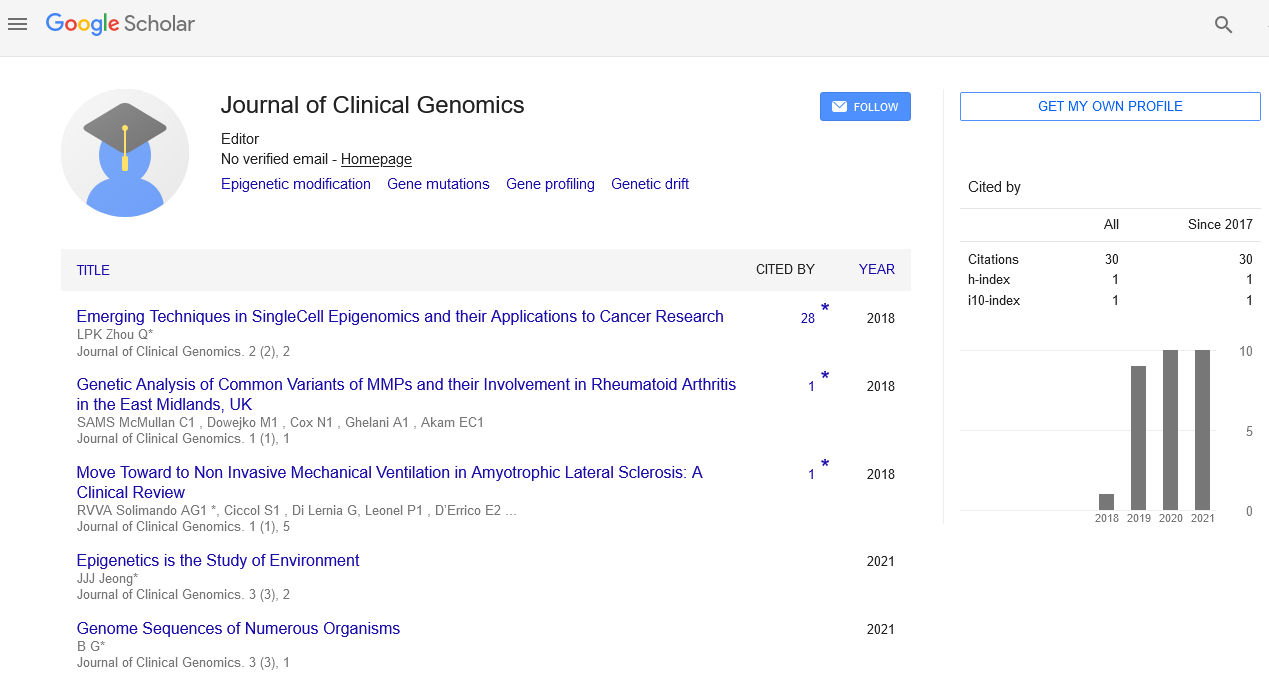Perspective, J Clin Genom Vol: 5 Issue: 2
Impact of Somatic Gene Mutations on Cancer Progression and Therapeutic Resistance
John Connolly*
1Department of Medicine, Vanderbilt University Medical Center, Nashville, USA
*Corresponding Author: John Connolly,
Department of Medicine, Vanderbilt
University Medical Center, Nashville, USA
E-mail: john@cnly.org
Received date: 23 May, 2023, Manuscript No. JCG-23-107404;
Editor assigned date: 26 May, 2023, PreQC No. JCG-23-107404 (PQ);
Reviewed date: 12 June, 2023, QC No. JCG-23-107404;
Revised date: 19 June, 2023, Manuscript No. JCG-23-107404 (R);
Published date: 26 June, 2023 DOI: 10.4172/JCG.1000130
Citation: Connolly J (2023) Impact of Somatic Gene Mutations on Cancer Progression and Therapeutic Resistance. J Clin Genom 5:2.
Description
Cancer is a complex and devastating disease characterized by uncontrolled cell growth and proliferation. Somatic gene mutations, which occur in non-germline cells during an individual's lifetime, play an important role in cancer development and progression. These mutations can result in the dysregulation of key signaling pathways, leading to tumor initiation, growth, and metastasis. Additionally, somatic mutations contribute to therapeutic resistance, making cancer treatment challenging. The impact of somatic gene mutations on cancer progression and the development of resistance to therapy shedding light on the challenges faced in the battle against cancer.
Somatic gene mutations are acquired alterations in the DNA sequence of somatic cells. When these mutations occur in genes involved in cell cycle regulation, apoptosis, and DNA repair, they can lead to the uncontrolled growth and division of cells, initiating the formation of tumors. Mutations in oncogenes, such as RAS and BRAF, can promote cell proliferation, while mutations in tumor suppressor genes, like TP53 and PTEN, lead to the loss of growth control and increased susceptibility to genetic instability. As cancer cells continue to divide and accumulate additional mutations, tumor progression occurs. Somatic gene mutations drive the heterogeneity of cancer cells within a tumor, leading to the development of subpopulations with distinct characteristics. This intratumoral heterogeneity can create challenges in cancer treatment, as different cells within the same tumor may respond differently to therapies.
One of the most significant challenges in cancer treatment is the development of resistance to therapies. Somatic gene mutations play a pivotal role in this process. Cancer cells can acquire new mutations or undergo clonal selection, allowing them to evade the effects of therapeutic agents. Several mechanisms contribute to therapeutic resistance. Targeted therapies are designed to inhibit specific molecules or pathways that are essential for cancer cell survival. However, the emergence of somatic mutations in the targeted genes or downstream effectors can render these therapies ineffective.
For example, mutations in the kinase domain of the Epidermal Growth Factor Receptor (EGFR) gene have been associated with resistance to EGFR inhibitors in non-small cell lung cancer. Chemotherapy and radiation therapy induce DNA damage in cancer cells, leading to cell death. However, somatic mutations in DNA repair genes, such as BRCA1 and BRCA2, can confer resistance to these treatments, as cancer cells become more proficient in repairing DNA damage.
Somatic mutations in genes encoding drug efflux pumps, such as ABC transporters, can increase the removal of chemotherapeutic agents from cancer cells, reducing drug efficacy and leading to treatment failure. Despite the challenges posed by somatic gene mutations in cancer treatment, precision medicine offers hope for personalized therapeutic approaches. As our understanding of cancer biology and somatic gene mutations continues to expand, we move closer to a future where cancer is treated with increasing precision and efficacy.
One mechanism by which somatic mutations contribute to therapeutic resistance is through the alteration of drug targets. Mutations in genes encoding drug targets, such as receptor tyrosine kinases or drug-metabolizing enzymes, can cause the cancer cells insensitive to treatment. Moreover, mutations can lead to the activation of alternative signaling pathways allowing cancer cells to survive and proliferate despite treatment.
Advancements in genomic sequencing technologies have enabled the identification of somatic mutations with high precision, offering insights into the genetic landscape of various cancers. Understanding the impact of these mutations on cancer progression and therapeutic resistance is essential for the development of more effective treatment strategies.
 Spanish
Spanish  Chinese
Chinese  Russian
Russian  German
German  French
French  Japanese
Japanese  Portuguese
Portuguese  Hindi
Hindi 